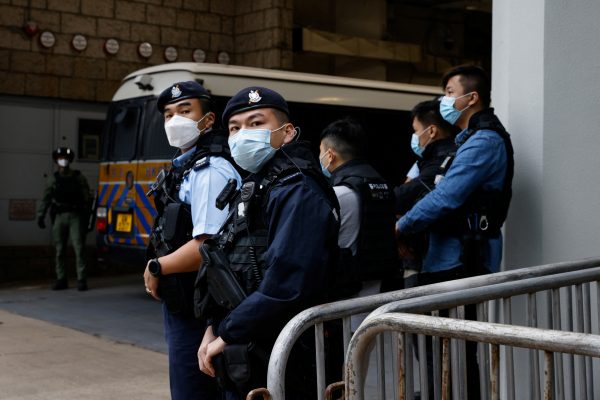In the latest such ruling, the effect is that pro-democracy former newspaper tycoon Jimmy Lai loses the chance to be represented by his British barrister, Tim Owen, in his upcoming national security trial. It is not uncommon for overseas counsel to appear in Hong Kong with the court’s permission and several courts had given the all-clear. But it was not to be.
Lai, a prominent critic of the Chinese Communist Party and press freedom award recipient, is already in prison. His popular Apple Daily and Next Digital mastheads are shuttered after sustained campaigns of demonisation by Chinese state media and ‘lawfare’ by Hong Kong authorities. He has previously served sentences for unlawful assembly after taking part in pro-democracy demonstrations and is currently serving five years on a questionable fraud conviction. He now faces charges of collusion with foreign forces under the National Security Law imposed on Hongkongers in 2020.
The ruling was possible because the National Security Law is not a product of Hong Kong’s own Legislative Council but one of a handful of Chinese national laws applied to Hong Kong over which Beijing maintains interpretive authority. The day-to-day implementation and application of these laws is left to Hong Kong institutions, but the ultimate power to dictate their meaning resides with the National People’s Congress Standing Committee (NPCSC). While this institution is attached to China’s main legislature, it resembles a supercharged organ of executive government in its power to issue wide-reaching regulations.
The Basic Law, Hong Kong’s quasi-constitution, is also a national law, giving Beijing extensive leverage over Hong Kong’s legal system as a whole as all local laws must be consistent with the Basic Law.
The situation shines light on the unique legal context of China’s Hong Kong, and China itself, as distinct from Western democratic systems of government. Rulings of the final appeal court are not in fact final but may be overridden by a non-judicial higher authority. The higher authority’s interpretive powers are not procedurally circumscribed but free-standing and may be invoked at the request of the court, the executive or on its own initiative. Moreover, legislative interpretation in the Chinese tradition is not confined to textual interpretation but includes the power to add to and modify text — effectively to legislate in retrospect.
In this instance, the NPCSC’s ruling requires the courts to send all national security cases to the Chief Executive, who heads the Hong Kong government, for prior instructions on handling them. Given the government’s view that foreign lawyers represent a national security threat, the result in situations like Lai’s is a fait accompli.
Should the courts fail to follow this process, the Committee for Safeguarding National Security will step in to resolve the matter. The Committee is led by the Chief Executive along with Beijing’s formal representative in Hong Kong, and its decisions command full obedience without the possibility of judicial review.
Some suggested that the NPCSC ruling empowered the local administration. But it situated authority firmly with the executive branch — a calibration of the balance of power consistent with the mainland’s own system and reflecting the Hong Kong executive’s ever-increasing political reliability and willingness to work towards Beijing’s goals. Some also said that the ruling avoided damaging Hong Kong’s judiciary, despite it effectively contradicting the region’s highest court. The mere fact of the intervention supplies further evidence that Beijing is willing to make real its declaration that Hong Kong has no separation of powers.
Judicial independence and authority are unavoidably diminished by this sort of intervention, and these are not the only concerns arising from the pursuit of Jimmy Lai. Hong Kong’s Secretary for Justice may continue spruiking its rule of law to whoever will listen. But where the courts are overruled by executive fiat, where the right to legal representation does not include the right to counsel of choice, and where equality before the law is waived when critics of the state are concerned, the rule of law has lost ground to authoritarian politics.
All of this bodes very poorly for the forthcoming national security trials of 47 pan-democrats who stand charged with subversion of government power over an unofficial primary election held in 2020. Ironically, the exclusion of overseas counsel stemming from the obsession with foreign interference — long an object of paranoia and blame in China and now for Hong Kong’s leaders too — will render the final crushing of Hong Kong’s home-grown political diversity an act of purely domestic violence. Hong Kong and China’s legal systems are another step closer to harmonisation.
Brendan Clift is a PhD Candidate and Lecturer at Melbourne Law School, The University of Melbourne.

